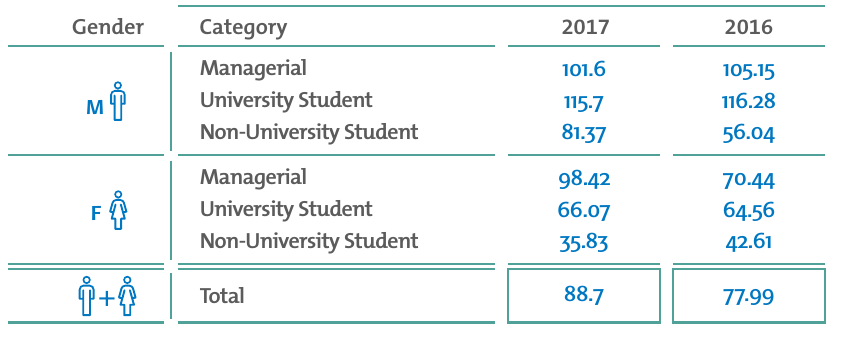Professional Development
The performance evaluation processes are performed annually with the purpose of supporting the professional development of Itaipu employees.
The Company adopts the Competencies Performance Management model, in which all professionals in the staff have access to an ongoing process of developing the knowledge and skills essential to the execution of the corporate strategy. Evaluations are applied digitally. In 2017, the fourth cycle was started for the definition of the Individual Development Plan, which defines the training to be carried out. During the period, 96.20% of employees participated in performance evaluation processes. The data for female employees was 92.91%. These are high indexes, which point to the consolidation of the Performance Management System.
Itaipu Binational offers its employees Corporate Training, focused on the development of competencies common to employees throughout the Company, and Specific Training, which aims to meet specific skills and needs of the various areas of the Entity.
The training actions involve the Corporate Education Project (PEC), initiated in 2014, as part of Corporate Education Governance at the strategic, tactical and operational levels. The Project is developed based on Learning Paths, linked to the macroprocesses of the Company's Value Chain. In 2017, the following learning paths were implemented: Materials Management, Finance Management, IT Management, Legal Management, Contracting of Goods and Services, People Management, Business Development.
In addition, the Corporate Education Virtual Environment was made available, a tool for the management of learning paths, creation and customization of contents of educational actions for e-learning solution and provision of educational actions to employees.
The Company invests in professionals who are seeking university education and specializations. The amounts and requirements for the benefit are defined in accordance with the Itaipu Binational Human Resources Procedures Manual. It is intended to update the document in 2018 to improve procedures and maintain the administrative efficiency of personnel development.
[404-1]Average number of hours of training per year per employee, broken down by gender and functional category
Activities require specialized abilities

[412-2; 410-1]
Training in Human Resources
In 2017, employees of companies providing surveillance services to Itaipu, following the contractual requirements, participated in recycling courses, which includes in the schedule the obligatory accomplishment of 2 hours of contents related to human rights. Of the 185 professionals from the security companies hired by Itaipu, 86 have undergone these trainings, accounting for 46.49% of the total.
Regarding security officers of the own staff, 59 out of a total of 120 agents carried out the aforementioned recycling course, reaching 49.17%. Keeping up with recycling courses is one of the prerequisites for them to be able to operate in the function.
In the period analyzed, there were no specific human rights training for employees of the Company's own staff.
[EU14] - [103-2; 103-3]Training for Industrial Area
Employees working in the technical areas perform activities that require specialized skills and mental and physical readiness, and for this reason, participated in the following specific trainings throughout 2017:
- Safety in Facilities and Services in Electricity (NR10) for 357 employees;
- Safety and Health in Work in Confined Spaces (NR33) for 74 employees and NR35 Work in Height for 34 employees;
- Graduation of the 1st class of the postgraduate course in Maintenance Management, in partnership with UTFPR;
- 85 educational actions for employees of the Superintendence of Maintenance and 81 actions for employees of the Superintendence of Operations, taught by internal instructors;
In addition to these, training courses were offered for Operators, Training of Electricians in Deenergized Lines, Planning and Control and Maintenance Management, promoted by ABRAMAM, and a Lecture Series on Safety of Dams.


 Brazil
Brazil
 Español
Español
